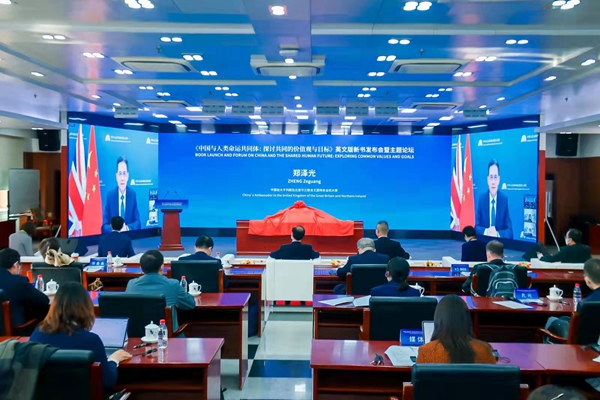British scholar's new book on shared human future launched in Beijing
British professor Martin Albrow's latest book "China and the Shared Human Future: Exploring Common Values and Goals" was launched in Beijing on Wednesday.

The launch ceremony for the book "China and the Shared Human Future" is held in Beijing, April 6, 2022. [Photo courtesy of China National Publications Import and Export (Group) Corporation]
British professor Martin Albrow's latest book "China and the Shared Human Future: Exploring Common Values and Goals" was launched in Beijing on Wednesday.
The book covers a range of topics such as mankind's shared future, global governance and China, the Belt and Road Initiative, China's poverty alleviation work, and the fight against COVID-19 from the perspective of a Western scholar.
While addressing the launch ceremony via video link, Chinese Ambassador to the U.K. Zheng Zeguang emphasized three points for building a community with a shared future for mankind: reasonable strategic mutual perception, correct way of coexistence, and global cooperation and development.
Violeta Bulc, former European commissioner for mobility and transport, underscored that Europe and China are like two lungs in the same body — only when they breathe together to their full capacity can the body perform well. "The next great move shall belong to a global civilization, and Europe and Asia can set the motion and co-shape it along with other global partners," she added.
The book points out that a community with a shared future for mankind is China's wisdom and solution to world peace, stability and development, noted Liu Bogen, vice president of China Publishing Group Corporation. "I believe it is an excellent book for foreign scholars to have an objective perception of China's governance and development."
Speaking of his reasons behind writing the book, the author Martin Albrow, also founding honorary president of Global China Academy, hoped it could "add even the tiniest extra encouragement to China to realize its spirit as a truly global nation." He added that "China, by virtue of its continuous history over millennia, by its population size and its economic progress, is now obliged to be a truly global nation."
During the panel discussion that followed, He Yaomin, former vice president of Renmin University of China, stressed that a shared future for mankind originates in the outstanding cultures of the world, and peace-loving peoples worldwide underpin such a future.
Martin Jacques, former senior fellow at the Department of Politics and International Studies at the University of Cambridge, pointed out a striking difference between China and the U.S.: While America is wedded to singularity and the exclusion of those countries it perceives to be different and therefore unacceptable, China, in comparison, is pluralist in its mentality and does not require other countries to be like it. "The idea of a shared future for mankind draws on the concept of ‘tianxia' (all under heaven), of a world view rather than a concept of the world divided into over 190 nation states," Jacques said.
David Ferguson, honorary chief English editor of Foreign Languages Press affiliated with China International Communications Group, explained how the war-loving military-industrial complex of America benefits from wars and conflicts around the world. He expressed his belief that a shared future can serve as a complete alternative to a world marked by hegemony and warmongering.
